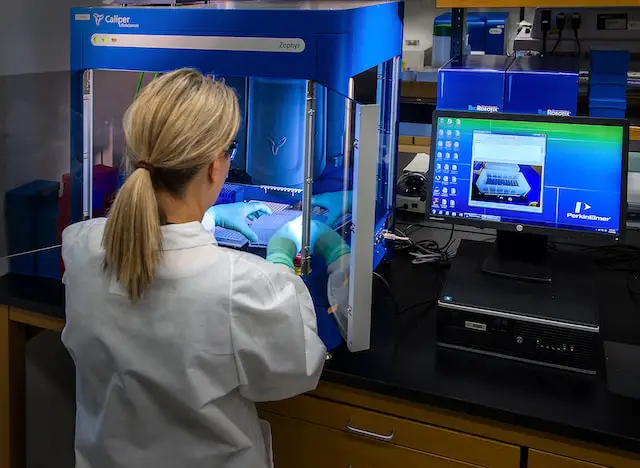AI applications are vast and rapidly expanding. This growth is enabled by advancements in computational power, data collection, and the development of new algorithms. Here is a comprehensive look at AI applications across various sectors:
- Healthcare:
AI is revolutionizing healthcare, making diagnostics and treatment more accurate, efficient, and personalized. Machine learning algorithms can analyze vast amounts of medical data to identify disease patterns, improving diagnosis and prediction. For instance, AI is used in radiology to detect abnormalities in imaging data. It’s also used in drug discovery, where AI can analyze the biological impact of various compounds to predict their effectiveness as potential drugs.
- Finance:
AI is extensively used in the finance industry for tasks such as fraud detection, risk management, algorithmic trading, and customer service. By analyzing historical transaction data, AI can identify patterns that indicate fraudulent activity. Similarly, AI models can analyze market data to predict future trends, guiding investment strategies. Chatbots and virtual assistants, driven by AI, are commonly used in banking to handle customer queries.
- Transportation:
Self-driving cars are perhaps the most well-known application of AI in transportation. Using a combination of sensors and AI algorithms, these vehicles can navigate roads and traffic. AI is also used in logistics, for route optimization in delivery services and in airline scheduling and ticketing.
- Education:
AI is bringing transformational changes in education by personalizing learning. AI systems can analyze a student’s performance and adapt the content and pace of instruction accordingly. AI-powered chatbots can help answer student queries round the clock, and AI-driven systems are being used to monitor student engagement and to detect cheating in online exams.
- Retail and E-Commerce:
In the retail sector, AI is used to personalize customer experiences, predict purchasing behavior, manage inventory, and improve logistics. Recommendation systems, driven by AI, suggest products to customers based on their browsing and purchasing history. AI is also used in chatbots that provide customer service.
- Manufacturing:
AI is being leveraged in manufacturing to improve efficiency and productivity. Predictive maintenance, powered by AI, can predict equipment failures before they happen, reducing downtime. AI-powered robots are used in assembly lines to automate repetitive tasks. AI is also being used in quality control, where machine learning algorithms can identify defects in products.
- Agriculture:
AI is being used in agriculture to optimize farming practices, thus increasing yield and reducing environmental impact. AI can analyze satellite images and weather data to predict crop yields and guide irrigation and fertilization. Drones, equipped with AI, can monitor crop health and pests.
- Entertainment and Media:
AI is increasingly being used in entertainment and media. Content recommendation algorithms are widespread in streaming platforms like Netflix and Spotify. AI is also being used to generate music, art, and even to write screenplays. Video games use AI to create more immersive and challenging experiences.
- Security and Surveillance:
AI is being used to improve security and surveillance. Facial recognition systems, driven by AI, are used for identity verification in security systems. In cybersecurity, AI is used to detect and respond to cyber threats. AI can analyze vast amounts of network data to identify patterns that indicate a cyber attack.
- Energy:
In the energy sector, AI is being used for demand prediction, grid management, and predictive maintenance. By analyzing historical and real-time data, AI can predict energy demand, allowing for more efficient energy production and distribution.
In conclusion, AI’s applications are broad and rapidly growing. As we continue to collect more data and develop better algorithms, the potential for AI to revolutionize various industries only increases. Yet, as we leverage AI’s potential, it’s crucial to ensure its ethical use, maintaining respect for privacy, fairness and transparency.
AI’s capabilities have extended into virtually every industry, but it’s crucial to remember that these technologies are tools and should be used responsibly. A key part of implementing AI is ensuring that systems are fair and don’t perpetuate or exacerbate existing inequalities. This means being conscious of biases in the data used to train these systems and rigorously testing and auditing AI systems for fairness.
Privacy is another significant concern. As AI systems often rely on vast amounts of data, it’s crucial to respect individuals’ privacy rights and protect their data. This is particularly important in sectors like healthcare and finance, where sensitive information is often involved.
Transparency, or explainability, is another important consideration. AI systems can sometimes act as ‘black boxes’, making decisions without human understanding. Efforts are being made towards developing ‘explainable AI’, which allows humans to understand and trust the decisions made by AI.
Looking to the future, the potential applications of AI are vast. With continued advancements in AI and machine learning technologies, we can expect to see AI become even more integrated into our daily lives, from personalized education systems to advanced healthcare diagnostics, autonomous vehicles, and beyond.
At the same time, as AI becomes increasingly prevalent, the importance of ethical AI practices will only grow. In this exciting new era, it’s crucial to strive not only for innovative AI applications but also for responsible and ethical AI development. With the right approach, AI has the potential to bring about significant positive change, driving progress in industries across the globe.
In conclusion, AI is more than just a revolutionary technology; it is a tool that holds the potential to reshape our society in ways we can only begin to imagine. Whether we reap its benefits will depend on how we handle its development – thoughtfully, responsibly, and with an eye towards creating a better future for all.







